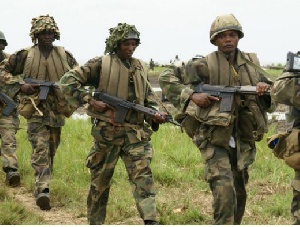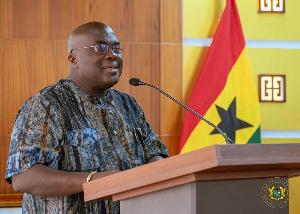Elmina, Aug. 9, GNA - The National Commission on Small Arms (NCSA) had urged security personnel at Ghana's borders to be vigilant and help stem the proliferation and trafficking of small arms and light weapons into the country.
Mr Jones Applerh, Acting Executive Secretary of the NCSA, who made the call, described as worrying the fact that some 66 percent of illicit arms that found their way into Ghana were trafficked along its borders and urged the Commission and its partners to be proactive to check its abuse. Mr Applerh expressed these sentiments at the opening of a three-day training enhancement workshop on: 93Border Security Management and Small Arms/Light Weapons Control," for security personnel drawn from the wester= n frontiers at Elmina.
It is aimed at equipping participants with the necessary knowledge and skills in modern control management techniques to enhance their operations at the country's borders to help check the proliferation of small arms an= d light weapons in the country.
He said though the country had been described as an oasis of peace, illicit arms in the hands of civilians was of great concern to the Commission considering the pockets of chieftaincy and land disputes coupled with the current high political temperature. Mr Applerh, in this regard, called for strategies to be evolved to minimize the circulation of small arms and light weapons in the country to help check the possible eruption of violent conflicts and disputes in the various communities.
Currently an estimated 130,000 illicit small arms and weapons are perceived to be in the hands of civilians with only 43.2 per cent of it registered while 34 per cent is illegally manufactured locally, according t= o a report on illicit small arms by the UNDP in 2004.
He said about 80 per cent of the locally manufactured arms and weapons were used in committing crime such as armed robbery and therefore the Commission would collaborate with other stakeholders to see how best local blacksmiths would be discouraged from engaging in such trade. Touching on the effects the circulation of small arms and weapons coul= d have on the country, Mr Applerh said easy accessibility could ignite communal violence, armed robbery and other social vices and this could affect the quality of education and health care delivery and eventually goo= d governance. Mr Bentum Qauntson, former National Security Coordinator, who opened the workshop, said the porous nature of the country's borders continued t= o pose a security threat to the borders, their entire communities and the country at large, generating security dilemmas and complexities. He enumerated a number of challenges confronting security personnel at the borders to include lack of support, logistics and relevant equipment to deal with the rate of armed group attacks, smuggling, vehicle theft, drug trafficking and the flow of small arms.
Mr Qauntson called for collaboration among the security personnel to enable them to deal with the complexities of their duties and stem security threats at the borders.
Lieutenant Colonel Ohene Asare, Chairman of NACS, said the Commission had developed a National Plan of Action against the proliferation of such arms in the country and stressed that it was the collective responsibility of all to rid society of illicit arms and weapons. Mr Louis Kuukpen, a Monitoring Evaluation Analyst of the UNDP, said th= e proliferation of arms and light weapons could result in community violence and this could affect the achievement of the Millennium Development Goals and called on all stakeholders to join forces to stem its circulation.
Regional News of Tuesday, 9 August 2011
Source: GNA












